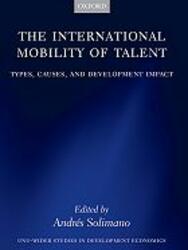Book Chapter
The International Mobility of Talent and Economic Development
An Overview of Selected Issues
Human talent is a key economic resource and a source of creative power in science, technology, business, arts and culture and other activities. Talent has a large economic value and its mobility has increased with globalization, the spread of new information technologies and lower transportation costs. Well educated and/or talented people are often more internationally mobile than unskilled workers. Immigrants with high human capital face more favourable immigration policies in receiving countries, typically high per capita income economies short of information technology experts, scientists, medical doctors and other types of talent. The purpose of this paper is to review analytical and policy issues related to the international mobility of talented individuals, examining the main types of talent who move internationally, their specific traits and characteristics and the implications of this mobility for source and destination countries and for global development.
 Join the network
Join the network